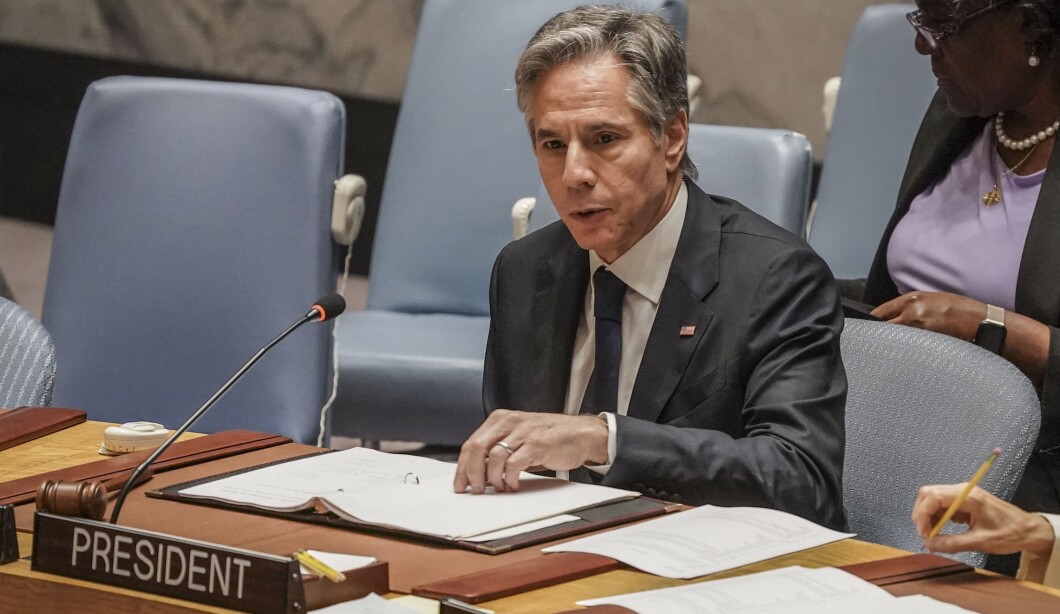
Russia regards Ukraine’s grain stockpiles as legitimate military targets under international law, a Russian diplomat declared during a debate on the link between war and famine.
“The prohibitions on attacking or destroying agricultural infrastructure do not apply if such infrastructure is used as sustenance for the members of the armed forces or in direct support of military action,” Dmitry Polyanskiy, the top Russian envoy at the United Nations, told the U.N. Security Council.
WHAT TO KNOW ABOUT FITCH DOWNGRADING US DEBT
Russian forces have launched a persistent bombardment on Ukrainian port cities and grain stores in the weeks since Russian President Vladimir Putin withdrew from an international deal to allow the export of Ukrainian grain. Russia and Ukraine’s Western partners are conscious that the soaring price of food puts diplomatic pressure on whichever governments are deemed responsible for the crisis.
“Strengthening food security is essential to realizing the vision of the United Nations Charter,” Secretary of State Antony Blinken told the Security Council. “That hope is embodied in one of the statues outside the building of a figure fulfilling the biblical directive to beat swords into plowshares. These words of Scripture are not yet in reach, but we can at least commit not to use our swords to destroy other’s plows.”

That statement served both to invoke a moral imperative and turn the Kremlin’s history at the United Nations against Putin’s current policy. “The Book of Isaiah contains the following passage: ‘They shall beat their swords into ploughshares, and their spears into pruning hooks; nation shall not lift up sword against nation, neither shall they learn war any more,’” a United Nations history of the statue recalls. “The sculpture was gifted to the United Nations by the USSR on December 4th, 1959.”
Russia’s recurring stratagem of using food as a “quiet weapon,” in the words of Kremlin Security Council chairman Dmitry Medvedev, has kept food security near the top of the international agenda throughout the full-scale invasion. “We will supply food and crops only to our friends,” Medvedev said last year.
Polyanskiy boasted Thursday that Russia has decided to send “25 to 50,000 tons of grains free of charge” to a bloc of six African countries — most of which either have a security relationship with Russia’s paramilitary Wagner Group, have expressed political support for Russia’s invasion of Ukraine, or sided with Russia when the United Nations General Assembly voted on Ukraine-related resolutions over the last year.
“Unlike Western neo-colonialists, we’re interested in building a more equitable system of resource distribution, so that developing states are not forever hooked on the needle of politically-conditioned [humanitarian aid that] is nothing other than primitive blackmail,” the Russian envoy said, through a U.N. interpreter. “Russia is ready to help you with us in every possible way.”
Russia’s deployment of anti-colonialist rhetoric could completely prevent African states from criticizing Moscow’s decision to scuttle the Black Sea grain initiative in implicit and explicit ways.
“We are concerned and deeply disappointed that the Black Sea Grain Initiative has not been renewed,” Ambassador Harold Agyeman, who leads Ghana’s mission to the United Nations, told the council. “A renewal of the initiative accompanied by the resolution of challenges of the export of Russian ammonia, as well as agricultural products and fertilizers to global markets, represents a more durable way to prevent the latest spikes in global food prices and strengthen global food security while mitigating their knock-on effects.”
Russian officials maintain that the Western economic sanctions have impeded their agricultural exports to a degree that justifies the blockade of Ukrainian grain as leverage to force an easing of the economic measures.
“Until the illegitimate obstacles artificially created by the West affecting Russian economic operators’ ability to supply agricultural products are eliminated, it will hardly be possible to restore the normal functioning of supply chains,” Polyanskiy said. “No matter how much you may try to shift the blame to Russia, the facts are not in your favor. So you must therefore decide what is more important for the U.S. and its allies — geopolitical considerations or the desire to help the developing world.”
CLICK HERE TO READ MORE FROM THE WASHINGTON EXAMINER
Blinken dismissed that line of argument in a press appearance after his statement to the Security Council, saying that the United States has not sanctioned Russian food exports and has worked with banks and shipping companies to assure them that they can cooperate in the export of Russian food supplies.
“Just now, if you look at where Russian exports are, its exports of food exceed what they were before its aggression against Ukraine,” he told reporters. “So, in the event of a return to the agreement, of course we’ll continue to do whatever is necessary to make sure that everyone can export their food and food products freely and safely, to include Russia. We want to see that food on world markets. We want everyone to benefit from the lower prices.”




